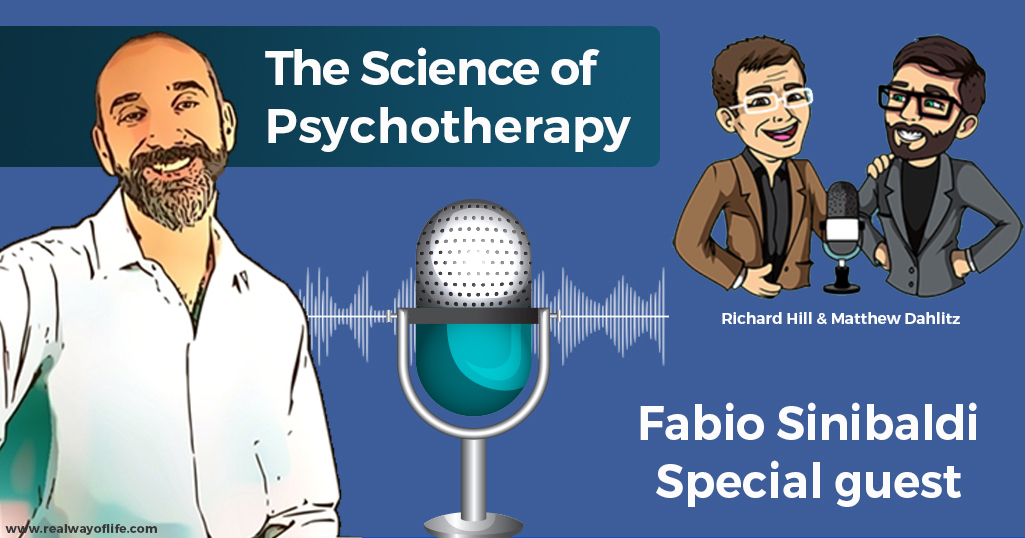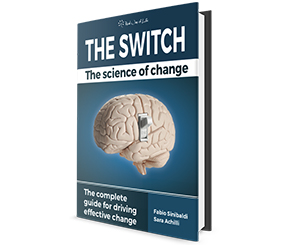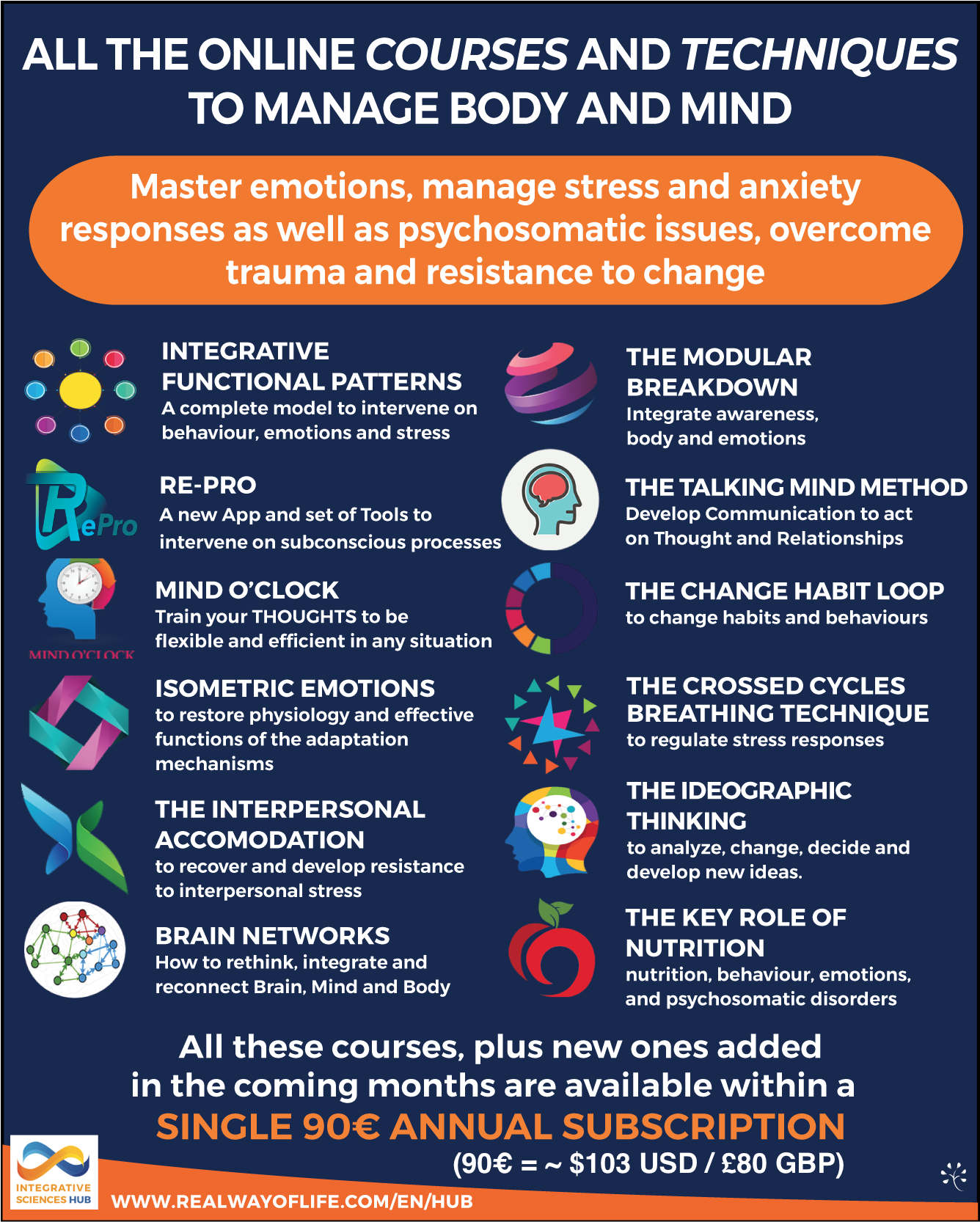
07 Nov Fabio Sinibaldi guest on The SCIENCE of PSYCHOTHERAPY’s podcast
I had the absolute pleasure and honour of being a guest on The Science of Psychotherapy‘s podcast!
“In this episode (September 2019) Richard [Hill] and Matt [Dahlitz] catch up with Fabio to talk a little about what he has been researching and his integrative perspective and his new book The Switch.”
We talk about change, development, growth and…
- working on muscles and postures
- nutrition and metabolism
- naturalness
- integrating mind and body
- effective tools
- and more
Some selected excerpts from the podcast:
[transcription powered by AWS Transcribe Artificial Intelligence]
Richard Hill: And so here we are, at the Science of Psychotherapy and having a wonderful time. And of course, this week, we’ve got… we’re really exampling what we love to do and that’s to spread ourselves around the world. And one of our great friends in the Science of Psychotherapy comes from the great land of Italy. […]
 Fabio has been doing all this wonderful work. We’ve already had him in the magazine. In an article, he does a fabulous book, The Switch, which has got marvellous processes in it on. We’re gonna have him talk to about us about all that stuff today. And, uh, well… I can’t wait for it.
Fabio has been doing all this wonderful work. We’ve already had him in the magazine. In an article, he does a fabulous book, The Switch, which has got marvellous processes in it on. We’re gonna have him talk to about us about all that stuff today. And, uh, well… I can’t wait for it.
Matt Dahlitz: Yes, yes. Very clever, fellow. Very practical. Communicates very well. Love it. Let’s get into it… Let’s go across to Italy. Well, Fabio Sinibaldi, welcome to the Science of Psychotherapy Podcast. It’s so great to have you here.
Fabio Sinibaldi: Oh, I’m really happy to be here with your today. It’s a great honour for me.
RH: But it is, of course, because of your book, which I know you have been working on for quite some time, that we are having you on the program today. We have already published in the magazine, some preliminary articles, but I was very excited to see the book come out now.
FS: […] our approach has a huge support by nutrition sciences for mental health, for change programs… So we [me and Sara Achilli] work together very well and support each other because, as you know, there are a lot of persons who want to start losing weight, but they have a psychological resistance… and on the other side, as we say in the book, there are many implications about the food we eat every day and our neurobiological process.
So, to make a very simple example: it is well known that PTSD is all about brain inflammations. So you have amygdala, insula, some areas very hyper-excited, the so called “hyperarousal”… So it’s really interesting knowing that some sugars, glutamate, and other food elements do the same work… So we are putting fuel on fire if we eat in the wrong way…
The good news is that you can reverse the process removing some food and adding some other nutritional components, and you can do on… different level, with the food we eat every day. […]
I know you are huge fans of memory reconsolidation processes… me too! The work from Bruce Ecker and other colleagues is great. I love trying to perfecting processes… doing a lot of research I’ve found that you can prepare your body, your neural biology to be more plastic (thus favouring the reconsolidation processes). So if you eat a lot of Omega 3, you can improve your neural plasticity before introducing memory consolidation techniques or EMDR sessions or other technique you already use…
There are also very interesting researches about other food components, such as the so-called medium-chain fatty acid, that you can find easily in a coconut butter… it’s not a medication! It’s good food! A very interesting research shows that with only two spoons a day of coconut butter, you can reverse partially the Alzheimer’s neural degenerative effect… So if you can’t do that with the degenerative processes in Alzheimer disease, you can imagine how powerful it is with anxiety, chronic stress, post-traumatic stress disorder, and so on. […]
Some other excerpts:
Another huge part of my work is about how to practically use all the great researches from neuroscience, neurobiology and other interesting fields… I am very excited every time I read new researches, such as those from Joseph LeDoux and Lisa Barrett Feldman, about the neural processes and mechanisms of our defensive responses and emotions, about the role of non-conscious predictions…
For example, the role of the insula in our brain is part of the Salience Network [our basic alert and self-regulation system] that is well known. But there are a lot of researches that are showing us that the insula responds very well to the movement, the slow movements of huge big muscles, such as the ones in the legs and in the back… and if you do this movement very slowly, and in the so-called negative phase (the positive movement is when you lift up something, the negative phase is when you slowly release the muscle and try to control it). We’re not used to control the negative phase, and this negative phase is very, very reinforcing the work and processes in the insula in the Salience Network.
RH: […] So do as you say. We find we come to the same place through different paths in order to its to disrupt. And I know we say disruption, but I would even be any kind of but softer, saying it’s a breaking of the rigidity, a breakthrough of the rigidity…. and then what I talk about in mirroring hands, which we try to do with breaking of the rigidity and in patterns, is that then creates the environment that the body can self regulate and self-repair… and that one of you where you say you’re working on one leg and then the other leg absolutely something that Sue has done with me many times. I’m having trouble with the with one thing and she says “stand on one leg” and I got all, for goodness sake, I stand on one leg and then on the other one, like, Oh, I feel much better. So this the ability to self regulate requires the appropriate circumstances off bodily circumstances on this is this is why I love those exercises you have in the book.
FS: Great. I appreciate it very much. And I totally agree. And you can do something… Disrupting it is very strong, the “hard” way sometimes could be useful. But other times we have to do something more gently, because we have a different process. We have to adapt to their [patients/clients] correct level off activation of arousal. […]
I’ve discovered that if you ask someone to do a push-up or to “fold” their body to recreate the foetal position […] we have developed a set of techniques called Isometric Emotions that is all about isometric movement, but in different ways. So we have protective movements such as a foetal position and the opposite: when we shorten the back muscular chain, it is the result of great surprise mixed with fear… If you ask someone to do one of these movements, they do it naturally. And if you benchmark that level as 100%, then try to ask: “okay, now contract at 90% now at 10%…” and it’s surprising because most of them realize that it’s easy to find this percentage, but it is obviously not a real mathematical match… There is something you do with your instinct that matches body activation with the cognition.
RH: is, Yeah, I can see you because the control is one word. But it’s also just awareness, which is what we lose in our very cognitive or very sort of over rational level cognitive mind. And you do need you. But your cognitive capacities can be used to enhance your ability to notice, to have that felt since and that some that’s a really, uh, interesting aspect of what you bring out. By doing this activity, you actually break or open the connection between your cognitive awareness and your biological activities.
MD: Yeah, I just love this conversation about this is a real holistic understanding of how we work and this integration of the schematics… You know, John Arden and others that are on and also talking about this holistic perspective that we can’t separate, you know, body brain in mind. I love what Fabio is doing here because he makes it so practical.
RH: […] this is the truth of development and growth. And we’ve disabled ourselves in so many ways in the way of modern culture, as a sitting down a lot, eating a lot more of processed foods and so on and so forth. And I would like to apply to the Switch and the book, and the processes… you are one of the people that are re-enabling ourselves… I think it’s more than just a nice thing. And isn’t Fabio clever? I think it’s actually terribly, terribly important work. And it is important as any of the global activities that were doing, to stop disabling our environment, disabling our culture and disabling our biology. So my recommendation to work with your your program, to work with your exercises can’t be stronger.




